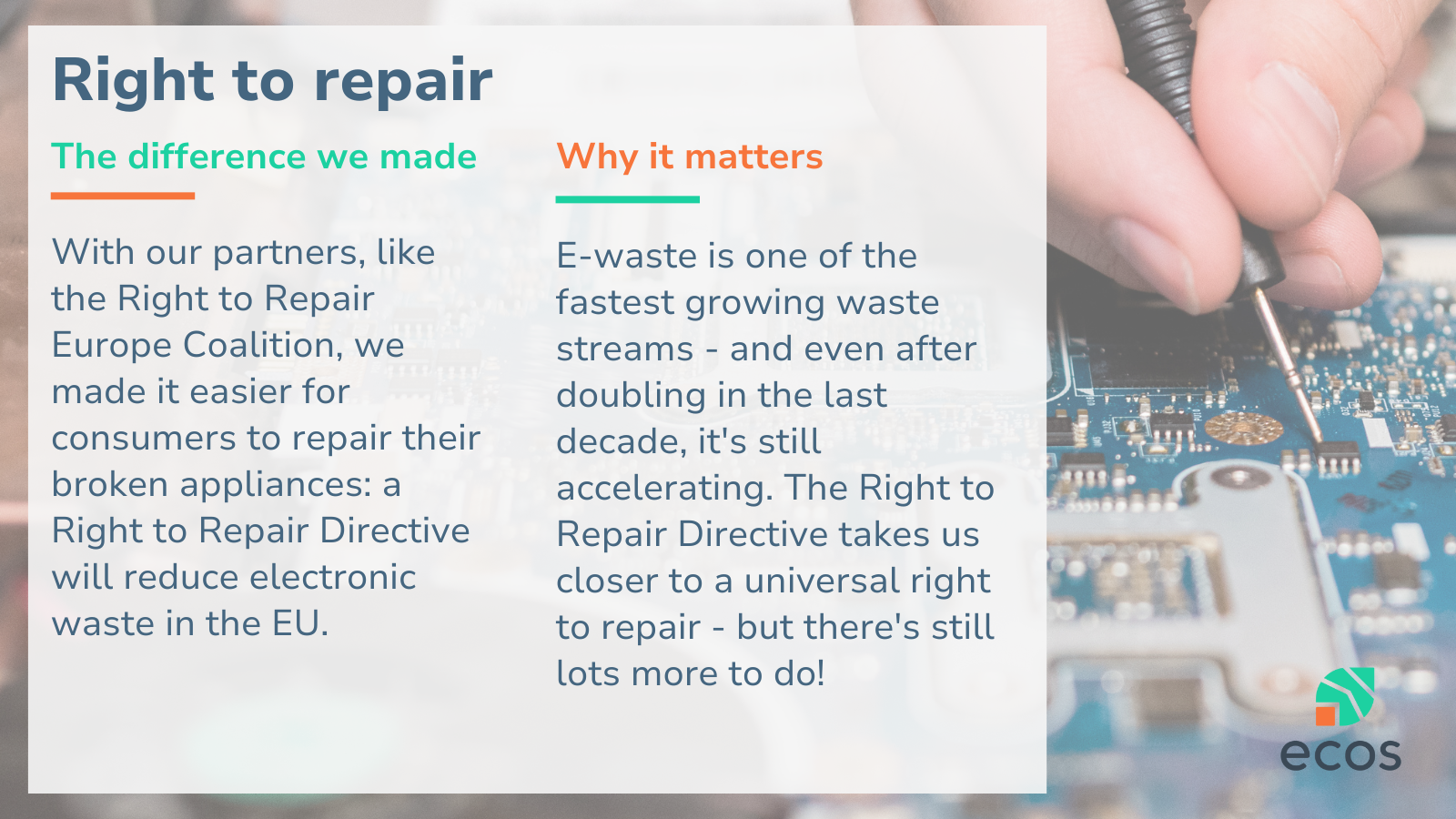Europe is getting closer to a universal Right to Repair
The EU now has a Right to Repair Directive — and ECOS was fundamental in making it happen! This is an important milestone that will help to stem the flow of one of the fastest growing waste streams: electronic waste. Not all products are covered by this law, so there is still work to do before we can talk about a truly universal right to repair in Europe, but in 2024 we took a big step towards it.

How many electronic devices do you have in your home? From phones, tablets, computers, and headphones to washing machines, vacuum cleaners, toothbrushes, and kettles — there are probably a lot more than you first think.
Over the last five years, the average number of electronic devices per person in Western Europe has almost doubled to more than nine each. Similar surges can be seen all over the world, with Western Europe outpaced only by North America.
And we usually don’t buy those devices to keep forever. Issues with lifespan, durability, and repair mean that a lot of them become waste — and recyclers cannot keep up. Collection and recycling rates of electronics have grown, but at a much slower pace than these products are produced and consumed. Every day, this problem — and the mountain of e-waste — grows. Over the past decade, the amount of e-waste annually generated worldwide has almost doubled, from 34 billion kg in 2010 to 62 billion kg in 2022.
For many years, the EU has used product policy tools like ecodesign and energy labelling to promote sustainability, but just because a product has been designed to be repairable doesn’t mean it will actually be repaired. Complementary consumer policy focusing on repair was missing… until now.
A European Right to Repair is on the horizon
In 2024, the EU adopted its very first Right to Repair Directive. It will help to empower consumers to seek repair within and beyond legal guarantee periods, making it easier to access repair options at a reasonable price.
After over five years of advocacy with the Right to Repair Europe coalition, which ECOS co-founded in 2019, we pushed for and ultimately put our stamp on this law, succeeding not only in making it happen in the first place, but also in making it better throughout the legislative process. From meetings with policymakers to technical papers to communications actions – we were every step of the way.
For example, the European Commission’s initial proposal did not include any provisions on the cost of repair, focusing only on repair obligations. The price of spare parts can be a huge barrier to repair, so we advocated since the beginning for affordable spare parts and repair services. We were successful, with amendments we pushed for on reasonable price included in the legislation.
However, those rules on reasonable price only apply to products that are already covered by repairability requirements under ecodesign — less than a dozen. So, the work is not over. We took some big steps forward, but there is still a way to go before the EU can boast a universal Right to Repair. In the coming years, we want to see more products covered by the EU’s ecodesign rules, and, as a result, also by this Directive.
What comes next?
The scope of the Right to Repair Directive must be expanded to cover more product groups through the Ecodesign for Sustainable Products Regulation (ESPR). The ESPR foresees horizontal approaches to ecodesign, allowing to cover a wide range of products at once, and ECOS will keep on pushing to ensure these apply to electronics in the upcoming ESPR Working Plan.
The Right to Repair Directive will soon be implemented by Member States, and it will be crucial to advocate for national incentives to make repairs easy and affordable. It’s not enough for a product to be repairable – the repair needs to feasible for end-users, and spare parts must be readily available and affordable.
We are one step closer to reducing the staggering amount of e-waste generated, but we have not yet made universal right to repair a reality. This is why ECOS will keep fighting the good fight — in 2025 and beyond.


